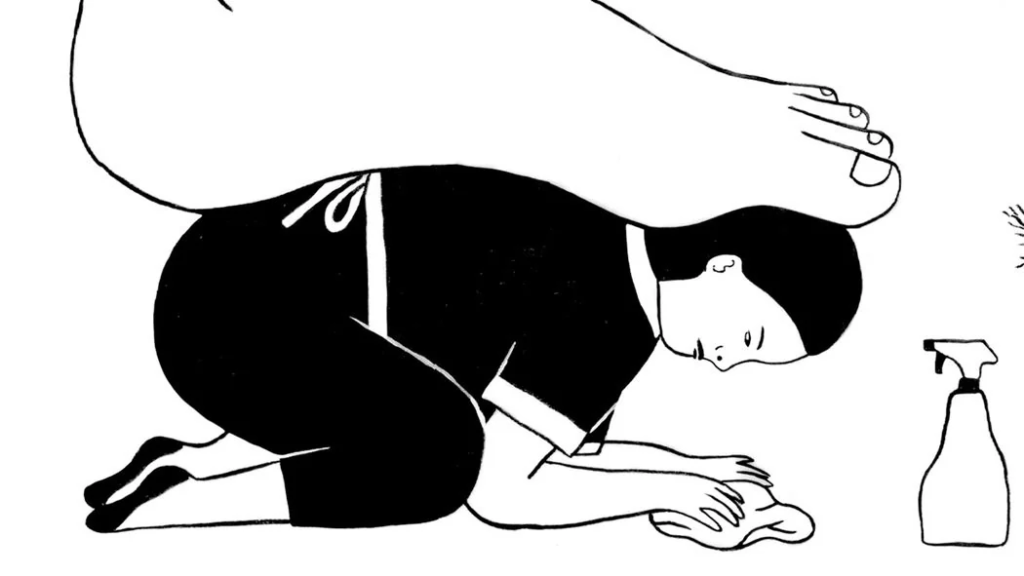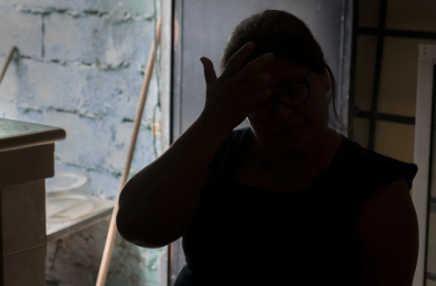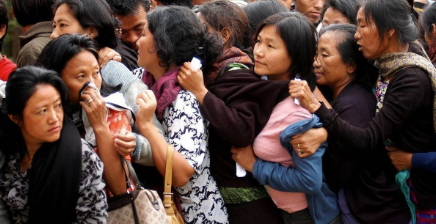
Source: medium.com
I’ll spare you the graphic details of the abuse and torture of a minor girl by a couple in Gurugram, Manish Khattar and Kamaljeet Kaur.
The 17-year-old daughter of Gond tribals had been brought from Simdega, Jharkhand by a placement agency and for the past five months had been caring for the couple’s three-and-a-half year old daughter. When she was rescued on February 7, she had visible injuries on her body.
The rescue began as a tip off to the NGO, Sakhi when a visitor to New Colony in old Gurugram saw the injured girl eating out of a community dustbin. That person was so appalled that they called up activist Deepika Narayan Bhardwaj who then informed Sakhi. The local police was contacted and within an hour-and-a-half the girl had been rescued and taken to the civil hospital where she is still being treated for her injuries.
The girl’s mother has since arrived from Jharkhand and is with her. “I cannot tell you the state she was in,” says a clearly upset Bhardwaj. “But day before yesterday when I visited her, she at least smiled at me.”
A long legal process has begun. Khattar and Kaur have been arrested on various charges including the stringent POCSO (Protection of Children from Sexual Offences), the SC/ST and Bonded Labour act.
The owner of the placement agency that had put the girl in the couple’s house, Arun Kumar Turi of Jharkhand and his associate Manish Nag have been arrested for human trafficking. At least 250 minor girls had been placed by the same agency since 2018 in various homes around Delhi NCR.
Acquittal rates of traffickers was as high as 89% in 2020, found the Trafficking in Persons report, 2022.
Jharkhand chief minister Hemant Soren said the police will bring the girl back to the state and she will be provided treatment, education and rehabilitation.
Both Manish Khattar and Kamaljeet Kaur have been sacked from their respective jobs after news of their arrest went viral on social media.

A problem in plain sight
The trafficking story is an old one with poverty at its core. Desperately poor families particularly from the tribal belt of Jharkhand, Bihar, West Bengal and Chhattisgarh send their children to work in cities as cheap labour in sari processing units, in brick kilns, for sex work in brothels and spas, and for domestic labour. This is done through a chain of contacts that begins from the family and ends at the placement agency, with each link in the chain receiving a pay-off, said Rishi Kant, an activist with Shakti Vahini.

Source: https://www.unicef.org
“Many of these children are minors who are in need of care and protection under the Juvenile Justice Act,” said Kant. “It is a matter of concern that they are brought through the organised crime of human trafficking. The exploitation of children is non-negotiable.”
The 17-year-old is one of five siblings. Her father tends goats and her mother collects firewood for cooking, Kant said. When her brother fell ill, the family had no money for his treatment. The 17-year-old and her elder sister (who was, mercifully, treated well by her employers) were put to work by her uncle. The placement agency was paid Rs 30,000 from Khattar and Kaur and out of this paid a commission of Rs 10,000 to its agent, Nag.
Turi, the owner of the agency, would travel to remote regions to convince family members to send their children to work–not a particularly hard sell given the poverty and lack of employment opportunities in the villages.
The pandemic effect
Census 2011 pegged child labour at 10 million out of a total population of 259.6 million children aged between 5-14.
But during the pandemic, child labour among vulnerable communities spiked by nearly 280%, according to a Campaign Against Child Labour study of 28 districts in Tamil Nadu and Puducherry, quoted in the Hindu. This was caused by loss of livelihood, reverse migration back to the villages and the closure of schools.
The Adivasi community remains one of the most deprived in India. A recent study on the livelihood status of this population in Jharkhand and Odisha, finds that Adivasis lag behind the rest of the country in not only household income but also nutritional outcomes, literacy and infrastructure like public transport.
[Read the study in Ideas for India here]
Who’s to blame?
In 2010, the Delhi high court for the first time (Bachpan Bachao v Union of India) sought to regulate placement agencies in Delhi NCR and defined domestic work as a hazardous industry in which children under 14 could not be employed.
Until then, says advocate Aparna Bhat who was appearing for an NGO, Butterflies in the case, some 123 placement agencies had been functioning in the capital region with no regulatory control. But loopholes allow them to continue running. Some have registered under the Shops and Establishment Act; others shifted to Noida and Faridabad so that the rules for Delhi don’t apply to them.
Domestic labour is, on paper, governed by minimum wages, but this is rarely (if ever) implemented.

Source: Care.org
It certainly seems strange that in the five months that the 17-year-old was with the couple at Gurugram, nobody seemed to have noticed her obvious injuries and distress. It took a casual visitor to spot her searching for food in a dustbin for her to be rescued
“There is no support system for domestic workers,” said Shakti Vahini’s Kant. “They work for 24 hours, cook and clean for families and are not even given a dignified salary in most cases.”
Rishi Kant worries that once the media move to another story, it will be back to business.
And placement agencies will continue looking for human beings to fulfil the big citys’ cheap labour requirements.
Know more
From Darjeeling to Delhi—story of a young girl who was trafficked
HAQ’s report on child trafficking in India
Satyarthi Foundation on child trafficking

In numbers

Source: Scroll.in
In Tripura, 31 of the 259 candidates who stood for the just concluded February 16 elections for 60 seats are women. The outgoing assembly has only three women MLAs out of 60.
Among the three north-east poll-bound states, Meghalaya is fielding 36 women among 375 candidates.
Nagaland has never had a woman MLA and only four out of 183 candidates are women.
Going places

Smriti Mandhana (Source: CNBC)
Any lingering doubt about the financial interest in a Women’s Premier League was dispelled on Monday with the auction of individual players. Smriti Mandhana’s Rs 3.4 crore salary is rarely seen in women’s team sport, writes Sharda Ugra.
On the eve of its inaugural five-team season, WPL cricket will be the highest paid in women’s team sport anywhere and will have a ripple effect with a “push to fast-track the number of women umpires, scorers, coaches, trainer, and physios around the game,” says Ugra.
Can’t make this up
In Karnataka where the sex ratio at birth of 910 girls for every 1,000 boys is lower than the national average of 919, some single men are wondering why they can’t find a suitable bride.
Seeking divine intervention, over 200 single men will embark on a 105-km march that begins in Mandya on February 23 and ends three days later at the Male Mahadeshwara hills temple in Chamarajanagar district, reports The Quint.
Stories you might have missed
It’s men, not live-in relationships, that kill

A lot is being said about the dangers of live-in relationships following two gruesome murders.
In the first, Sahil Gehlot killed his live-in partner of four years after his family fixed his wedding to someone else. On February 10, he strangled Nikki Yadav in the front seat of a car with tinted windows, drove 40 km to his dhaba in Najafgarh in south west Delhi with plans to stuff her in a refrigerator later. Then he returned home and married the woman his family had picked for him.
Elsewhere, in Nalasopara in district Palghar near Mumbai, Hardik Shah killed his partner Megha Torvi and dumped her body in the cavity of their bed before running away to Rajasthan from he was arrested.
The murders echoed the killing of Shraddha Walker by her partner Aftaab Poonawala who, after killing her, had chopped her body into pieces and thrown at different places in the city.
National Commission of Women head Rekha Sharma said families should accept live-in relationships, “If girls are given right to select their partners, these types of incidents can decrease.”
But the sad fact is that intimate partner violence is India (and the world’s) tragic reality. One in three women experiences physical, sexual, mental, emotional or financial abuse—regardless of whether they are in live-in relationships or married; regardless if the marriage is arranged or for love. An abusive man will be abusive whether he’s in a live-in relationship, has had a love marriage, or an arranged match.
As long as girls are brought up to be submissive, as long as parents counsel them to “adjust” and fail to support them, the abuse will continue.
It must end now.
Caste and campuses

A photo frame of Darshan Solanki placed at the condolence meeting.(Source: thewire)
The death by suicide of 18-year-old Darshan Solanki, a first-generation Dalit student, the son of a plumber and a domestic worker, at IIT, Bombay has renewed conversation around caste-based oppression on India’s campuses and brings to mind the 2016 death of Rohith Vemula at the University of Hyderabad. The student’s family says he had to battle discriminatory behaviour after fellow students found out about his caste. “What do you do on these campuses that our children just end their lives?” Solanki’s mother Tarlikaben asked as her son’s body was being taken for a post-mortem. She deserves an answer.
The long(ish) read
The public protest by India’s most renowned wrestlers against their own federation and powerful president Brij Bhushan Sharan, a six-time MP with four pending criminal cases, is just the tip of the iceberg that hides the larger stain of sexual harassment in Indian sport.
From kabaddi to taekwondo, cycling to sailing, instances of sexual harassment by coaches and officials in academies, hostels and sport institutes are rife—and the rot runs deep.
Read Avishek Roy, Rutvick Mehta and Sharad Deep’s deep dive here.
Field notes
Of mice and men
It seems to work on mice, but will it on men? A new study by Weill Cornell Medical in New York has met with success, at least with mice, in slowing down sperm as it swims through the female reproductive tract to reach the egg located in the fallopian tubes.
When 52 male mice were injected with an experimental compound, researchers found that it inhibited an enzyme that allows sperm to move. The effect lasted for less than three hours and by 24 hours all sperm recovered normal movement.
Since an injection before sex might not exactly set the mood, researchers found that the oral version of the shot is just as effective.
It might be a while though before the male pill hits the market. Next up: rabbits
AROUND THE WORLD

In Scotland, the surprise resignation of Nicola Sturgeon, leader of the Scottish National Party and First Minister, weeks after New Zealand’s Jacinda Ardern said she didn’t have enough in the tank to continue as prime minister reopened conversation on the toll of politics on the personal lives of women.
Some said her resignation stemmed from recent political setbacks including her strategy for securing independence and gender reform that British prime minister Rishi Sunak said he would block.
But, Sturgeon herself explained: “Maybe I want to spend a bit of time on Nicola Sturgeon the person, the human being.”
Spain has become the first country in Europe to pass a slew of changes that will, among other things, entitle women workers to paid menstrual leave, reports Associated Press. The other changes:
Period products: free in schools and prisons.
The morning-after pill and hormonal contraceptives: available at state-run health centres.
Gender change: without medical supervision to all citizens over 16.
Abortion: parental consent not required for 16 and 17-year-olds.
In Syria, women have borne the burden of keeping shattered families together during 12 years of civil war when economic collapse left millions dependent on international aid, reports Associated Press. The devastating earthquake which killed tens of thousands and left millions homeless in southern Turkey and northern Syria has only added to their woes. Read more here.

| Were you forwarded this email? Did you stumble upon it online? Sign up here. |
| That’s it for this week. Do you have a tip or information on gender-related developments that you’d like to share? Write to me at: namita.bhandare@gmail.com. |